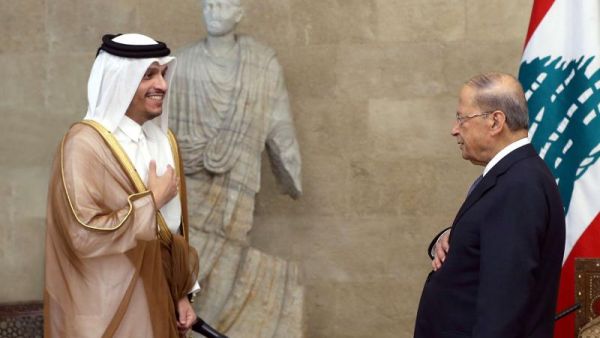Qatari Foreign Minister Sheikh Mohammed bin Abdulrahman al-Thani made new promises of help to the desperate Lebanese people without backing these promises with evidence or guarantees.
Meanwhile, former Lebanese Prime Minister Saad Hariri brought the clock for forming a new government back to zero by announcing he had withdrawn his name from the list of candidates for the premiership, in a move observers interpreted as reflecting Saudi reluctance to back his reappointment, as well as foreclosing any prospect of cooperation with Lebanese President Michel Aoun.
Meeting with Aoun was at the top of the Qatari foreign minister’s agenda during his visit to Lebanon, which reflects Beirut’s bet on Qatari and Gulf help as a whole. Sheikh Muhammad bin Abdulrahman, however, left the door just ajar for such support when he said he had no knowledge of the existence of a Qatari deposit to help Lebanon overcome its severe financial crisis.
In a press conference after meeting with Aoun, the Qatari foreign minister stressed the need for political stability in Lebanon and for “reforms to emerge from the heart of Lebanese interests, and not be the result of external pressure.”
The minister said that Qatar “affirms its solidarity with Lebanon,” noting that there are clear directives from Qatari Emir Sheikh Tamim bin Hamad al-Thani “to study projects affected by the explosion.” However, he quickly pointed out that “the details of the program have yet to be specified.”
“We are about to study the reconstruction of public schools in cooperation with the United Nations Children’s Fund (UNICEF), and the restoration of some hospitals damaged by the blast that rocked Beirut port earlier this month,” he added.
He pointed out that “Qatar had a plan to support Lebanon even before the explosion, and we have ideas that we will be discussing with the Lebanese state.”
Sheikh Muhammed, however, denied that there was a special fund for Lebanon and said that, for the moment, there were just talks “on how to support Lebanon to enable it to get out of the economic crisis, and it is certain that this support requires cooperation from all parties in the field of the legislation necessary for it, and we are still at the stage of talks, but the explosion that happened had disrupted these talks, and we look forward to resuming them.”
Despite the ambiguity surrounding Qatar’s offer of support, the Lebanese president welcomed any assistance that Doha could provide in rebuilding Beirut’s stricken neighbourhoods.
Observers said that Qatar’s vague positions reflect foreign powers’ suspicion over Lebanon’s uncertain political situation, especially regarding government formation and the ability of any new government to implement international demands that stipulate curbing Hezbollah’s influence.
As Qatar joins France and Turkey as part of a list of donor countries pledging support to Lebanon, all eyes are focused on the “reforms” that would be initiated by Lebanese authorities, particularly the composition of the next government and the extent of Hezbollah’s influence. It is precisely this dilemma that makes the formation of the next cabinet difficult to achieve; and it was one of the reasons that prompted the most prominent candidate for its presidency, Saad Hariri, to apologise and withdraw his name from the list of candidates.
Hariri announced that he would not run for the position of prime minister of the new government due to what he described as blackmailing practiced by some political forces in the country in order to maintain their grip on certain power gains. He thanked “everyone who submitted my name as a candidate to form a government that will assume this noble and difficult national task at the same time.”
He said in a statement that, like all Lebanese, he noticed that “some political forces are still in a state of severe denial about the reality of Lebanon and of the Lebanese, and they see this as just a new opportunity to practice blackmail on the basis that their only goal is to cling to weak power gains or even to realise supposed personal dreams of eventual power gains.”
“Out of my firm conviction that the most important thing at this stage is preserving the opportunity for Lebanon and the Lebanese to rebuild their capital, achieve the well-known reforms that are long overdue, and open the way for friends in the international community to get involved in helping to confront the crisis and then investing in the return of economic growth, I declare that I’m not a candidate for the presidency of the new government, and I hope everyone will stop circulating my name in this regard,” he added.
Experts dismiss the notion that Hariri’s decision to withdraw is final, considering that the Future Movement leader may be using the existing international pressure on the Lebanese political class to obtain concessions from Hezbollah and President Michel Aoun and his son-in-law Gebran Bassil, head of the Free Patriotic Movement.
The experts, however, indicate that the main reason for Hariri’s lack of enthusiasm for assuming the premiership was the absence of Saudi Arabia in an arena that is vital for Riyadh in its showdown with Iran. They point out that Saudi Arabia’s silence on the situation in Lebanon made Hariri lose the most important card that buttresses his influence and power in the event he ventures into leading a government controlled by Hezbollah and its allies. Hariri would have needed Riyadh’s full and strong support and expression of its determination to back a national Lebanese political player capable of curtailing Hezbollah’s control over the country.
In addition, by refusing the premiership, Hariri eliminated all hope for any cooperation with Aoun, and therefore chose to distance himself from a government likely to walk the same political and economic paths as before and which are likely to be met with widespread protests. This is why he urged the president to call for parliamentary consultations without delay as a matter of adherence to the constitution.
This article has been adapted from its original source.








